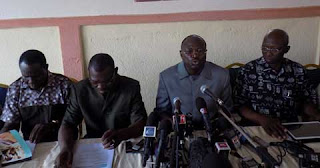A Beninois presidential candidate for every card in the deck

I updated my post on the Benin election , to add Prime Minister Zinsou to the top of the list, and then I noticed a friend of mine shared a post from Henri N'dah-Sekou with all 52 candidates. One for every card in the deck! Here's the content from his post (I bolded the names that were in my earlier post): 2016 comme jamais! Plus de 50 candidats pour la présidentielle. Une vraie brochette. Un pur casse tête pour la CENA. Un vrai labyrinthe pour les électeurs. Les 15 millions de caution fixés par le code électoral seront ils suffisants pour dissuader certains? 1 Ake Natonde 2 Karimou Chabi Sika 3 Patrice Talon 4 Pascal Irénée Koupaki 5 Abdoulaye Bio Tchane 6 Celestine Zannou ...















